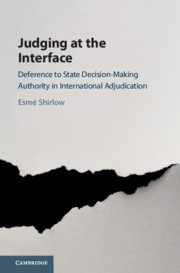Book contents
- Judging at the Interface
- Judging at the Interface
- Copyright page
- Dedication
- Contents
- Figures
- Tables
- Foreword by Judge James Crawford
- Acknowledgements
- Table of Cases
- Table of Treaties, Resolutions, and Declarations
- Abbreviations
- Introduction Deference and the International Adjudication of Private Property Disputes
- Part I Conceptual Framework and Methodological Approach
- Part II Deference in the International Adjudication of Private Property Disputes
- Part III The Systemic Role of Deference in International Law
- 8 Deference in Different Times and Contexts
- 9 The Systemic Implications of Deference in International Adjudication
- 10 Bringing Principles into Practice: Grappling with Deference in International Adjudication
- Conclusion Deference as a Story of International Law and Adjudication
- Appendix Data Tables
- References
- Index
8 - Deference in Different Times and Contexts
from Part III - The Systemic Role of Deference in International Law
Published online by Cambridge University Press: 24 February 2021
- Judging at the Interface
- Judging at the Interface
- Copyright page
- Dedication
- Contents
- Figures
- Tables
- Foreword by Judge James Crawford
- Acknowledgements
- Table of Cases
- Table of Treaties, Resolutions, and Declarations
- Abbreviations
- Introduction Deference and the International Adjudication of Private Property Disputes
- Part I Conceptual Framework and Methodological Approach
- Part II Deference in the International Adjudication of Private Property Disputes
- Part III The Systemic Role of Deference in International Law
- 8 Deference in Different Times and Contexts
- 9 The Systemic Implications of Deference in International Adjudication
- 10 Bringing Principles into Practice: Grappling with Deference in International Adjudication
- Conclusion Deference as a Story of International Law and Adjudication
- Appendix Data Tables
- References
- Index
Summary
This Chapter uses descriptive statistics to investigate how approaches to deference in international private property claims differ according to regime, and whether they have changed over time or according to context. The aim is to identify – based on the inductive, qualitative, review – whether some approaches to deference have been more prevalent than others in different times or contexts. The Chapter investigates regime-specific trends in approaches to deference. It highlights differences in the frequency with which the modes of deference, and approaches to authority, were applied by adjudicators in each regime. It further examines the different approaches to deference exhibited by adjudicators at the ECtHR Grand Chamber and Committee/Chamber levels, and in ICSID and non-ICSID arbitral decisions. The Chapter further emphasises the dynamic qualities of deference to investigate whether approaches to deference have changed over time. It identifies a rise in applications of modes of deference reflecting a concurrent view of authority and a dynamism in the approaches of adjudicators to selecting grounds for deference within the mode of deference as respect.
Keywords
- Type
- Chapter
- Information
- Judging at the InterfaceDeference to State Decision-Making Authority in International Adjudication, pp. 197 - 220Publisher: Cambridge University PressPrint publication year: 2021

